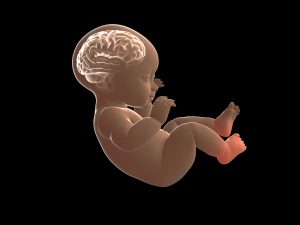
By jm1366 at Shutterstock
Like in adults, the signs and symptoms of a traumatic brain injury in infants can vary greatly. It all depends on the location and extent of the age, the age of the child, premorbid abilities, and which functions are affected (i.e. cognitive, sensory, etc.). The overall effects of a traumatic brain injury in infants can be temporary or permanent; it is impossible to say without a firm, in-depth diagnosis. And even then, no two children are the same. What is common for one infant may be completely the opposite in another.
Many young children who suffer a traumatic brain injury typically develop normally after their initial recovery process. The overall developmental progression goes on relatively unhindered. Some continue to display long-term difficulties, however, including learning disabilities and social interaction impairments. These cognitive functions are impacted for life.
Furthermore, with children, the overall impact of traumatic brain injuries is vastly different from an adult due to the brain still developing. Unfortunately, this means some children may not present any effects of their injury until later in life, once their sensory system and frontal lobe have developed past adolescence.
Signs of a TBI in Infants
The signs and symptoms of a traumatic brain injury in infants are similar to that of an adult, though they do vary in some regards.
The physical symptoms include:
- Changes to bowel or bladder function
- Changes on consciousness, ranging from a brief loss to a coma state
- Fatigue
- Headaches
- Impaired movement, balance, and coordination
- Motor speed deficits
- Reduced muscle strength
Sensory and perceptual symptoms include:
- Auditory dysfunction resulting in difficulty hearing speech, vertigo, hypersensitivity to sound, loss of postural stability or control.
- Visual changes, including the perception of color, size, depth, and distance; changes to visual acuity; double vision; issues with visual convergence or accommodation; sensitivity to light.
Feed and swallowing difficulties may include:
- Oral or pharyngeal dysphagia.
- Risk of aspiration due to cognitive impairment while eating.
Lastly, behavioral and emotional symptoms in infants include:
- Agitation, aggression, and combativeness.
- Changes in sleep patterns.
- Excessive drowsiness.
- A disorientated or foggy feeling.
As you can see, the range of symptoms in infants is extremely varied and far-reaching.
If your infant has endured a traumatic brain injury, find support and information on the topic with TryMunity at community.trymunity.com. Take part in our community today!



